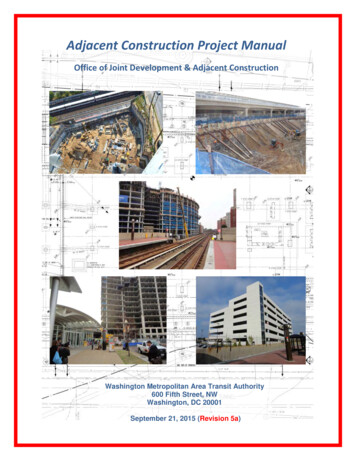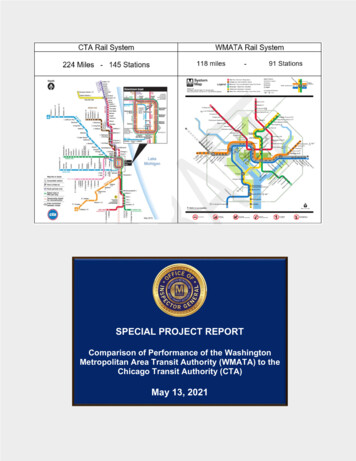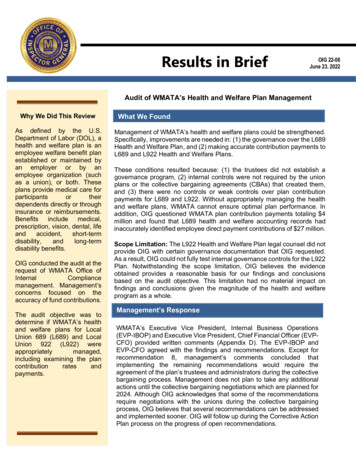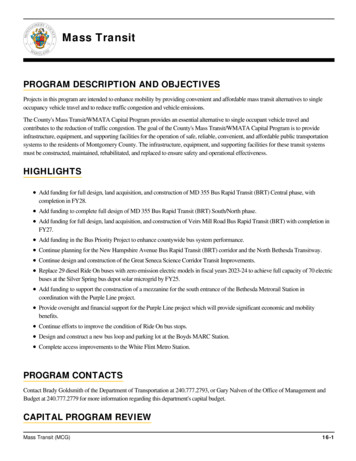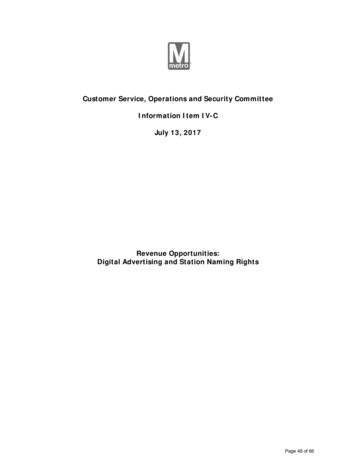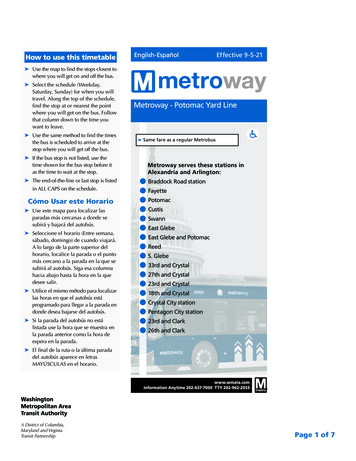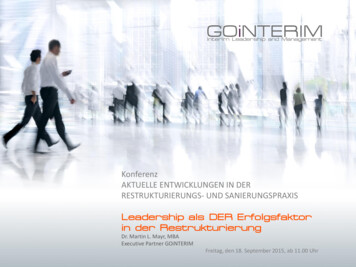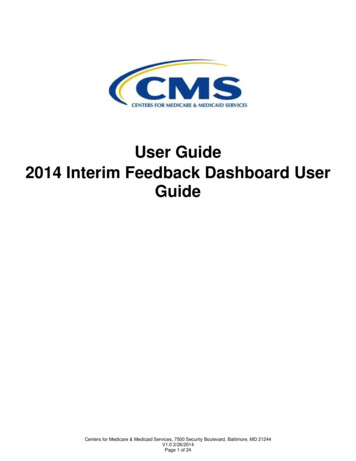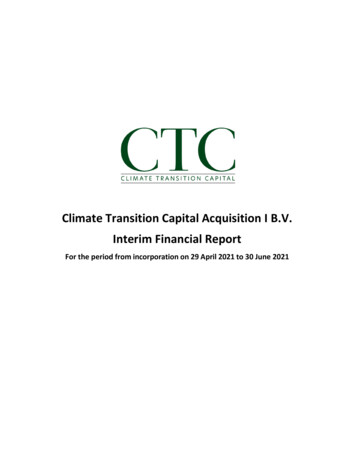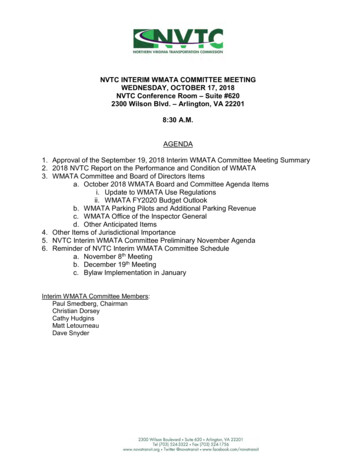
Transcription
NVTC INTERIM WMATA COMMITTEE MEETINGWEDNESDAY, OCTOBER 17, 2018NVTC Conference Room – Suite #6202300 Wilson Blvd. – Arlington, VA 222018:30 A.M.AGENDA1. Approval of the September 19, 2018 Interim WMATA Committee Meeting Summary2. 2018 NVTC Report on the Performance and Condition of WMATA3. WMATA Committee and Board of Directors Itemsa. October 2018 WMATA Board and Committee Agenda Itemsi. Update to WMATA Use Regulationsii. WMATA FY2020 Budget Outlookb. WMATA Parking Pilots and Additional Parking Revenuec. WMATA Office of the Inspector Generald. Other Anticipated Items4. Other Items of Jurisdictional Importance5. NVTC Interim WMATA Committee Preliminary November Agenda6. Reminder of NVTC Interim WMATA Committee Schedulea. November 8th Meetingb. December 19th Meetingc. Bylaw Implementation in JanuaryInterim WMATA Committee Members:Paul Smedberg, ChairmanChristian DorseyCathy HudginsMatt LetourneauDave Snyder
Finance and Capital CommitteeAction Item III-AOctober 11, 2018Use Regulations Update4 of 60
Washington Metropolitan Area Transit AuthorityBoard Action/Information SummaryActionInformationMEAD Number:202028Resolution:YesNoTITLE:Use Regulations UpdatePRESENTATION SUMMARY:Staff seeks Board approval of the revised and restated 2018 Use Regulations whichgovern the permitted use of Metro Property by others, as well as seeks additionalauthority to better implement the use of Metro property by others.PURPOSE:Request Board approval to:Revise and restate the Use Regulations;Authorize the sale of food and drink on Metro property outside of Metrorailstations’ paid areas; andDelegate to the General Manager/Chief Executive Officer the authority toapprove commercial uses on Metro property.DESCRIPTION:Metro periodically updates its Regulations Concerning the Use of WMATA Property(the "Use Regulations"). The current Use Regulations were published in 2008 andhave not been updated since. Several Board authorizations to increase opportunityfor third-parties to use Metro property and generate revenue for Metro have beenapproved since 2008; the revised and restated 2018 Use Regulations capture thoseapprovals. Additionally, in drafting the revised and restated Use Regulations, staffidentified areas for added efficiency and opportunity in how Metro manages itsproperty and as such is seeking: (1) authorization to sell food and drink on Metroproperty outside of Metrorail stations’ paid areas, and (2) a delegation of authority tothe General Manager/Chief Executive Officer (GM/CEO) to approve commercial useson Metro property.Key Highlights:- The proposed revisions to the Use Regulations capture Board authorizationsand approvals since 2008, when the Use Regulations were last published, andmake clearer to third-parties who seek to do business with Metro what therules and requirements governing the use of Metro property by others are.5 of 60
- To streamline Metro's internal approval process and increase opportunities forcommercial uses on Metro property and generate new revenue for Metro, staffrecommends the Board to delegate to the GM/CEO the authority to approvecommercial uses on Metro property.- The Board has already approved the sale of food and drink on Metro parkingfacilities, but had limited such activity to weekends and holidays. Metroreceives requests from third parties to set up farmers markets on weekdaysand to organize pop-up retail in under-served submarkets. These activitiesinclude the sale of food and drink, sometimes during the weekday.Background and History:Metro first published Regulations Concerning the Use of WMATA Property in1987. Metro's desire to activate its Metrorail stations and other properties, aswell as the desire to generate additional revenue from property permits andleases, is long-standing. Increasingly, as private and community proposals touse Metro property and as revenue-generating opportunities have beenpresented, the Board has authorized certain third-party uses of Metro property.The following uses are currently permitted on Metro property:Communications antennas and equipment, as well as fiber optic cables(1995);Non-transit, public parking, civic and limited commercial uses on parkingfacilities (2002);Commercial uses (excluding the sale of food, beverage and tobacco),subject to final Board approval before installation (2004);Commercial ventures (i.e. retail sites and vending machines) andconcession stands in both free and paid areas of Metrorail stations,subject to final Board approval before installation (2006); and,Sale of food and beverage on parking facilities on weekends andholidays (2017).At this point, most community and commercial uses are permitted, except forthe sale of tobacco, drugs, firearms, or any other illegal substances (which staffis not proposing to change). The opportunity going forward is to increaseflexibility for staff to manage and implement the Board's intent to more fullyutilize Metro property and to generate revenue.Discussion:The Regulations Concerning the Use of WMATA Property (the "UseRegulations") regulates the use of Metro property by others. The UseRegulations prioritize the use of Metro property for transit purposes andoperations, as well as the safety of the riding public and Metro employees.Among other things, the revised and restated 2018 Use Regulations provideMetro's standard terms and conditions for obtaining a permit from Metro, whichinclude:6 of 60
Description of authorized activity or useStandard of conductPermit fee/costPermit termCleaning and maintenance requirementsIndemnification and insurance requirementsWMATA termination rightsThe proposed 2018 Use Regulations also incorporate Board approvals since2008, when the last Use Regulations were published. These authorizationsinclude:Sale of food and drink on Metro's parking facilities during weekends andholidaysDelegation to the GM/CEO to approve commercial uses on parkingfacilitiesAmong other things, the proposed Use Regulations revise defined terms,cross-reference both WMATA’s advertising guidelines and the rules andregulations governing the Art in Transit program, and clarify WMATA’s policyregarding Speech and Performing Activities. The proposed revised andrestated Use Regulations eliminate "public telephones services" as anallowable activity, as Metro no longer installs public telephones on its property.In drafting the revised and restated Use Regulations, staff identified areas foradded efficiency and opportunity in how Metro manages its property and assuch is seeking: (1) authorization to sell food and drink on Metro propertyoutside of Metrorail stations’ paid areas, and (2) a delegation of authority to theGM/CEO to approve commercial uses on Metro property.In July 2017, the Board approved the sale of food and drink on Metro parkinglots on weekends and holidays intended to support activities such as farmersmarkets, festivals and other events that would generate community amenitiesand activity. However, in emerging submarkets, farmers markets and othersuch retail may best be suited for weekdays, when employees and otherpatrons in the station area seek services and food options. Also, theseactivities may not be best accommodated on Metro parking facilities, as Metrohas several large areas outside its Metrorail stations that are underutilized.Therefore, staff seeks greater flexibility as to when and where Metro permitsthe sale of food and drink. Staff recommends permitting the sale of food anddrink to areas outside the Metrorail stations’ paid area, thereby allowing thesale of food and drink in locations appropriate for retail and community activity,not only on Metro’s parking facilities.Lastly, the Board previously delegated to the GM/CEO the authorization toapprove commercial uses on Metro's parking facilities, but did not delegate theBoard's authority to approve commercial uses on other Metro property. At thistime, staff recommends delegating to the GM/CEO the authority to approve7 of 60
commercial uses (as permitted in the Use Regulations) on Metro property,whether on a parking facility or elsewhere. This provides Metro with theflexibility to issue permits for uses that may be more appropriately located onMetro property other than parking facilities, without needing to seek Boardapproval for each use or permit. Uses on Metro property must also complywith local jurisdictional rules and regulations, so activities of concern (suchlarge festivals, activities that may generate environmental and/or noiseconcerns, etc.) are regulated independently of Metro by the local jurisdiction inwhich the Metro property is located.FUNDING IMPACT:This Board action is a policy review and approval, not a project or budget approval.Project Manager: Nina evious ActionsJuly 2017 - Board authorization to sell food and drink onMetro parking facilities on weekends and holidays; Boarddelegation of authority to the GM/CEO to approvecommercial uses on Metro propertyAnticipated actionsafter presentationNovember 2018 - Publish the 2018 Amended andRestated Use RegulationsRECOMMENDATION:Board approval to:Revise and restate the Use Regulations;Authorize the sale of food and drink on Metro property outside of Metrorailstations’ paid areas; andDelegate to the General Manager/Chief Executive Officer the authority toapprove commercial uses on Metro property.8 of 60
Use Regulations UpdatesFinance & Capital CommitteeOctober 11, 20181WASHINGTON METROPOLITAN AREA TRANSIT AUTHORITY9 of 60
Updates to Use RegulationsPurpose Request Board approval to: Revise and restate the Use Regulations Authorize the sale of food and drink on Metro property outside of Metrorailstations’ paid areas Delegate to the General Manager/Chief Executive Officer the authority toapprove commercial uses on Metro property2WASHINGTON METROPOLITAN AREA TRANSIT AUTHORITY10 of 60
Updates to Use RegulationsScope of Use Regulations Regulates the use of Metro property by others Prioritizes use of Metro property for transit operations Ensures safety of the riding public Ensures property is used safely Provides guidance on activities that generate revenue and issue permitsfor permitted uses Excludes transit-related uses, joint development and utility activities3WASHINGTON METROPOLITAN AREA TRANSIT AUTHORITY11 of 60
Updates to Use RegulationsBackground 1987First publication of Use Regulations 1995Communications antennas and equipment, as well as fiber optic cables approved 2002Non-transit, public parking, civic and limited commercial uses on parking facilities approved 2004Commercial uses (excluding the sale of food, beverage and tobacco) approved, subject tofinal Board approval before installation 2006Commercial ventures (retail sites) and concession stands in both free and paid areas ofMetrorail stations approved, subject to final Board approval before installation 2017Sale of food and beverage on parking facilities during weekends and holidays anddelegation to GM/CEO to approve commercial uses on parking facilities approved4WASHINGTON METROPOLITAN AREA TRANSIT AUTHORITY12 of 60
Updates to Use RegulationsPermitted Uses and Activities5Filming andPhotographyAdvertising onBuses, Trains, andin StationsVending ofNewspapersTemporary UsesATMsCommunicationsEquipment andFiber OpticsElectronic Displaysand DigitalAdvertisingPublic TelephoneServicesPublic andCommunity UsesCommercial UsesWASHINGTON METROPOLITAN AREA TRANSIT AUTHORITY13 of 60
Updates to Use RegulationsProposed Revisions to Use RegulationsRevise and restate Use Regulations to: (i) update current practices, (ii) reference Metroprograms offered, (iii) add Board approvals made since 2008, and (iv) add any newauthorized uses.Current Practices Standardized permitterms and conditions Process for selectingand/or authorizingproposed uses Public telephones nolonger in use6Metro Programs Arts In Transit Metro PerformsPrior Board Approvals New types of andlocations for advertisingdisplaysNew Authorized Uses(if approved) Sale of food and drinkson Metro property outsideof Metrorail stations Delegation to GM/CEO toauthorize commercialuses on parking facilities Sale of food and drinkson parking facilitiesduring weekends andholidaysWASHINGTON METROPOLITAN AREA TRANSIT AUTHORITY14 of 60
Updates to Use RegulationsSale of Food and DrinkOutside of Paid AreasNew Carrollton Metro StationJoint Development Site Food and drink approved parkingfacilities, on weekends and holidays Farmers markets, festivals, other eventsnot limited to weekends and holidays Emerging submarkets can benefit fromfood trucks or other food services onweekdays7WASHINGTON METROPOLITAN AREA TRANSIT AUTHORITY15 of 60
Updates to Use RegulationsDelegation to GM/CEO Approval of Commercial Uses Variety of commercial interests expressed Desire to respond to market opportunities ina timely manner Commercial uses on Metro property stillsubject to local jurisdictions’ regulations andto a Metro real estate permit8WASHINGTON METROPOLITAN AREA TRANSIT AUTHORITYExamples of VendingOpportunities Health and beauty Electronics Electronic charging stations Photo booths Entertainment: DVD rental,games, lottery Package/mail pick-up anddelivery lockers16 of 60
Updates to Use RegulationsRecommendation Board approval to: Revise and restate the Use Regulations Authorize the sale of food and drink on Metro property outside of Metrorailstations’ paid areas Delegate to the General Manager/Chief Executive Officer the authority toapprove commercial uses on Metro property9WASHINGTON METROPOLITAN AREA TRANSIT AUTHORITY17 of 60
SUBJECT:APPROVAL TO AMEND AND RESTATE USE REGULATIONSRESOLUTIONOF THEBOARD OF DIRECTORSOF THEWASHINGTON METROPOLITAN AREA TRANSIT AUTHORITYWHEREAS, In Resolution 87-02, the Board of Directors approved the RegulationConcerning the Use of Washington Metropolitan Area TraAsit Authority Property (''UseRegulations''), as subsequently amended; andWHEREAS, The Use Regulations have not been updatea since OGtober 2008; andWHEREAS, Staff has drafted amended and restatea Use Regulations (attached hereto asAttachment A) that: (1) update current practices, (2) add uses approved by the Boardsince 2008, (3) add new authorized uses, and (4) ci:oss-reference other relevant Metroprograms; andWHEREAS, Currently the sale of food and cir.ink is permitted only in parking lots only onweekends and holidays; andWHEREAS, Staff recommends permitting the sale of food and drink in parking lots on anyday of week, and permitting the sale of food and drink on WMATA property outside ofMetrorail station paid areas on any day of week; andWHEREAS, Staff recommends Clelegating to the General Manager/Chief Executive Officerauthority to apRrove commercial uses on WMATA property that will improve the efficiencyof implementing leases and licenses for commercial use of WMATA property; NOW,THEREFORE, be itRESOLVED, That the Board of Directors hereby approves the sale of food and drink inparking lots on any day of week, and the sale of food and drink on WMATA propertyoutside of Metrorail station paid areas on any day of the week; and be it furtherRESOLVED, That the Board of Directors hereby delegates to the General Manager/ChiefExecutive Officer the authority to approve commercial uses on WMATA property; and beit furtherRESOLVED, That the Board of Directors hereby approves the amended and restated UseRegulations as set forth in Attachment A; and be it finally
RESOLVED, That this Resolution shall be effective 30 days after adoption in accordancewith§ 8(b) of the WMATA Compact.Reviewed as to form and legal sufficiency,WMATA File Structure No.:21.8.1 Use Regulation2
REGULATIQNSCONCERNING BE USE OFWMATA PROPERTYAPPROVED BY BOARD RESOLUTION 2018-XX[DATE]
TABLE OF CONTENTSINTRODUCTIONSECTION 1 ceptions to Permit RequirementsUses Excluded From the Scope of these Use Regulations bufR:equiring a PermitSECTION 3 USE PERMITS3.1Application Process3.2Terms and ConditionsSECTION 5.3PERMITTED ACTIVITIESSpeech or Performance ActivitiesFilming and PhotographyNewspapers and Commercial PublicationsAutomated Teller MachinesVending MachinesUse of Parking FacilitiesCommercial Bicycle and Scooter GomQaniesTelecommunications EquipmentSolar PanelsIntercity Bus ,Bay(s)Art in TransitADVERTISING ON WMATA PROPERTYAdvertising GenerallyAdvertising GuidelinesComP-uterized Electronic Passenger Information DisplaysSECTION 6 USE OF WMATA GRAPIDCS AND/OR LOGOAPPENDIX A: LIST OF BOARD OF DIRECTORS APPROVED ADVERTISINGINVENTORYAPPENDIX B: APPLICATION & USE PERMIT FEE SCHEDULE
REGULATIONS CONCERNING THE USE OF WMATA PROPERTY("USE REGULATIONS")Subject to the exceptions noted below in Section 2, these Regulations Concerning the Use ofWMATA Property (the "Use Regulations") govern commercial and non-commercial uses ofWashington Metropolitan Area Transit Authority's ("WMATA" or "Metro") property.WMATA receives many requests from commercial, Not-for-Profit, community and o er groups,and persons seeking access to WMATA property and facilities. The purpose of these UseRegulations is to ensure that WMATA property is used safely, that all WMAT property shallbe preserved for the transit use to which it was lawfully dedicated, and iliat the use and activitiesby any person and/or entity (other than WMATA Employees or contractors) of WMA Aproperty be consistent with and not interfere with transit operations.Subject to the exceptions set forth below, any person or entity authorize by )VMATA to useproperty must sign a Permit for that purpose.Modifications to these Use Regulations must be made by an affirmative vote ofWMATA'sBoard of Directors.Advertising - a printed, digital or electronic media display for the purpose of conveying amessage. A Commercial Publication is a subset of Advertising. Advertising is not permitted bythese Use Regulations except as set forth below.Art in Transit (or AIT1) - a program under WMATA' s Office of Architecture that manages theplacement of visual art work and performances in the Metro system.Automated Teller Machine (or ATM)- electronic banking equipment that permits publicaccess to authorized l:ianking functions.Civic Use - activities/events held for the general public and/or the surrounding neighborhoodsand communities, organized by a WMATA Compact Jurisdiction, such as (but not limited to)local paraCles, bike tours, festivals, or farmers' markets.Commercial Publication - circulars, for sale/rent publications, signs or other marketingpublications and information intended to promote commercial product(s), services, orenterprise(s). Commercial Publications are not permitted by these Use Regulations.(Newspapers are not Commercial Publications.)Commercial Use - the use of WMATA property for the primary or incidental purpose ofpromoting or selling products or services, fundraising, and/or generating revenue. (CommercialUse does not include Performance Activity.)
Computerized Electronic Passenger Information Displays - visual displays primarilyintended to provide transit information to Metro riders but that can also provide Advertising,including, but not limited to, light-emitting diode (LED) displays, video monitors, computermonitors, and plasma screens.FTA-the Federal Transit Administration.Joint Development - the development of WMATA' s real property interests at or near masstransit facilities that have significant commercial development potential to achieve close physicalintegration of transit facilities with commercial/retail, recreational/entertainment, and residentialdevelopment.Leaflet - small printed material unfolded or folded providing information that is SpeechActivity.Newspaper - any publication intended for general circulation, P,ublished regularly or in shortintervals, and containing information and editorials on current events ana news of generalinterest.Not-for-Profit - any activity by a religious, educational, scientific, artistic, philanthropic,agricultural, labor, veteran, or fraternal organization or association that is not organized for profitas defined in the U.S. Internal Revenue Code or its successors, as amended from time to time,and none of the net income of which inures to the benefit of any private stockholder orindividual.Parking Facilities - WMA TA' s Kiss & Rides, Park & Ride surface lots, Park & Ride garages,and on-street parking spaces.Performance Activity - a musical, dance, spoken word, theatrical, or other presentation of anartistic nature, including presentations that invite patrons to make individual donations to theperformer(s).Permit - a lega contract executed by WMATA and the person/entity (Permittee) conducting theactivity. '.A Permit may be a lease, license, some other type of permit, or some other type of legalcontract allowing for the use ofWMATA's property.Permit :Applicant - a person or entity who applies for a Permit.Permit Application - a form that must be completed and submitted to WMATA for anyproposed use ofWMATA property.Permitted Activity - an activity approved by WMATA or not prohibited by law or by WMATArule or regulation that does not interfere with patrons' use of transit facilities or Metro operationsgenerally.Permittee - a party allowed to use WMATA property through a Permit.Page2
S&I Yard - a WMATA Metrorail storage and inspection yard.Speech Activity-the exercise of rights to free speech, free assembly, and other conductprotected by the First Amendment of the United States Constitution that is not a CommercialUse.Vending Machine - an electronic or mechanical machine that sells commercial products orprovides package pick-up and/or delivery service through lockers or other devices connected toelectrical power.WMATA Compact - the federal and state legislation creating WMATA by the United States,the District of Columbia, the State of Maryland and the Commonwealth o( Virginia.WMATA Compact Jurisdiction - any organization created by mqnicipal , county or stateagencies that are party to the WMA TA Compact.WMATA Employee - any part-time or full-time, temporary or permanent, exempt or nonexempt, represented or non-represented individual, including interns, who is compensated byWMATA for his/her services by wages, salary, or other remuneration.2.1APPLICABILITYThese Use Regulations describe the types of activities subject to a valid Permit issued byWMATA that may be conducted on WMATA property by any person or entity that is not aWMATA Employee, officer or board member authorized to act on WMA TA' s behalf. TheseUse Regulations also establish criteria under which a Permit may be obtained to enable thePermit Applicant to use WMATA property for one of the Permitted Activities.EXCEPTIONS TO PERMIT REQUIREMENT2.2No person or entity shall be allowed to use WMATA property without a Permit except: WMATA Employees, officers, and members of the Board of Directors acting within theirofficial capacity. When not acting within their official capacity, WMATA Employees,officers, and members of the Board of Directors ofWMATA shall need a Permit for anyuse of'WMATA property that normally requires a Permit. While acting on official business as it relates to WMATA facilities, officials, employeesand agents of the United States Government and/or of the WMATA CompactJurisdictions and the political subdivisions within them. Contractors, agents, subcontractors and suppliers under contract to WMA TA and onlywith respect to designated physical areas and purposes covered by that contract.Page 3
2.3Passengers riding on the WMATA rail and bus system and other transit-related users.Photography by an individual with a hand-held camera for an individual's own noncommercial use. A fee shall not be required for such photography, but such individualsshall be required to pay the fare to enter the Metro system.USES EXCLUDED FROM THE SCOPE OF THESE USE REGULATIONS BUTREQUIRING A PERMITThese Use Regulations exclude Joint Development, adjacent construction, e -:vironmental andgeotechnical testing, and activities conducted by other transit agencies and utility companies onWMATA property for their own purposes. Although excluded from tliese Use Regulations, theusers outlined in this Section must obtain a rights of entry agreeme t, e ement, Permit, or otherrelevant document/permissions to work on or near WMATA property for the uses sta ed herein.WMATA shall, at its sole discretion, determine which prope ies it wiU offer for use by a thirdparty, either under a Permit or other type of contract. Those use,s are governed by the followingpolicies, manuals, and websites: 3.1To apply for a Permit visit cfm.Application fees are listed in Appenmx B. Permit Application forms are processed byWMA TA' s Office of eal Estate and Parking (or such other Office as is designated as the issuerin these Use Regulations). :r'he actual proposed user must be the submitter of the PermitApplication because Permits are not transferable. WMATA shall determine whether or not thePermit App ication is for a Permitted Activity. Should WMATA determine that the number ofapplications for Permits exceeds the space available at any location, WMATA shall allocate thespace according to compatibility with WMATA's mission and purpose and best value toWMATA.Permits will be granted according to the following principles, in order of priority: The activity does not have a negative financial or operational impact on WMATA;The activity does not distract from or interfere with WMATA Employees, contractorsand/or transit users adhering to WMA TA' s core mission of providing safe and accessibletransit services;The activity enhances service to Metrorail, MetroAccess, and Metrobus riders;Page4
The activity generates additional revenue for WMATA; andThe activity improves local place-making and community building.Permits shall not be issued for the sale of tobacco, drugs, and firearms, for uses that are illegal,for uses that undermine, show unfavorably or compete with WMATA's brand and/or Metrotransit services, and/or for uses that show the Metro system in general or WMATA Employees oragents in a disparaging manner.3.2STANDARD TERMS AND CONDITIONS3.2.1.Contents. The Permit shall contain the name of the person or entity, typeof Permitted Activity, duration of activity, maximum number of individuals permitted onWMA TA property, insurance and indemnification, and other terms specific to the use allowedfor the location of the Permitted Activity.Standards of Conduct. Use ofWµA T.A property shall not interfere with3.2.2.transit operations, riders, the public and other transit acti ities (eyen when an activity has beenapproved) or the safety of transit riders and the efficient operatien of e transit system, or otheractivities being conducted on WMATA property.3.2.3.Time Period. The term or duration of time that Permittee is allowed tooccupy WMATA property will be stated in the Permit.3.2.4.Extensions. The term/dura ion 6fthe Permit will not be extended, unlessWMA TA, in its sole and absolute discretion, grants an extension. Permittee may file anapplication for a new Permit at any time, which shall be issued using the evaluative criteria andprocesses that are in place af the time the new or extended Permit is applied for; the granting ofone Permit does not create an expectancy of. renewal or extension or "grandfather" a use. Whenapplying for an extension of a Permit, the Permittee may incorporate by reference anyinformation filed with the revious Permit Application for that Permit.3.2{5.Fees/Payment to WMATA. Fees for use ofWMATA property are listedin Appendix B. Fees for uses not listed in the Appendix Bare to be determined by the Directorof Real Estate and Parking (or such other Office as issues the particular Permit). The fees andcharges assessed for commercial filming that exceed one day in a Metrorail station or thatrequire use of train cars to be filmed in S&I Yards will include administrative and operationalstaff hourly costs plus a thirty-five percent (35%) margin of overhead.Cleaning and Maintenance. Permittee will be responsible for depositing3.2.6.any trash resulting from its activities in appropriate trash containers or may be required toremove the trash from the location.Denial of Permit. A Permit Application for a Permitted Use may be3.2.7.denied ifWMATA determines that the requested space is unavailable, the proposed activitywould cause a safety problem, or the planned activity involves a use prohibited by law or byWMATA rule or regulation, that the proposed activity interferes with patrons' use of transitPages
facilities or Metro operations generally, or that the proposed activity is otherwise prohibited.WMATA also may deny a Permit if a previously issued Permit to the Permit Applicant or any ofits affiliated persons or entities was revoked or if the activities of the Permit Applicant or any ofits affiliated persons or entities under a previously issued Permit violated the terms of the Permit,law or WMA TA rule or regulation or interfered with patrons' use of transit facilities or Metrooperations.3.2.8.Revocation. A Permit may be terminated ifthe Permittee violates theterms and conditions of the Permit.3.2.9.Indemnification. Each Permittee shall agree to fully indemnify and saveharmless WMATA against any and all liability arising out of Permittee'·s activities. Thisindemnification is not limited to the extent of the Permittee's insura ce coverage.3.2.10.Insurance. Before commencing activities on W:r'A property, eachPermittee shall provide an acceptable policy of insurance coY-erage appropriate to the activity inaccordance with the insurance schedule included in the Bermit.3.2.11.No Cost to WMATA. In addition o any Permit fee, the Permittee mustreimburse WMATA for staff time to include administrafve, safet)'., escorts, plan review, projectreview, s
2. 2018 NVTC Report on the Performance and Condition of WMATA 3. WMATA Committee and Board of Directors Items a. October 2018 WMATA Board and Committee Agenda Items i. Update to WMATA Use Regulations ii. WMATA FY2020 Budget Outlook b. WMATA Parking Pilots and Additional Parking Revenue c. WMATA Office of the Inspector General d. Other .

